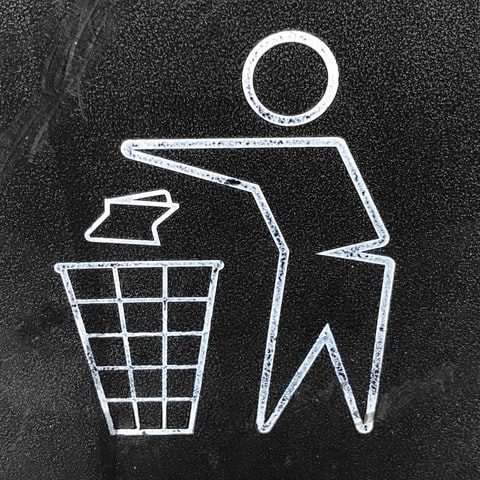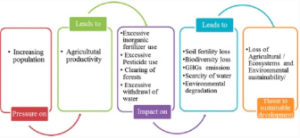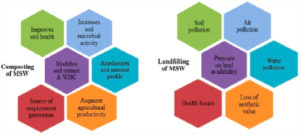Benefits from Waste Composting

While industrialization and urbanization are growing, significant problems such as global warming and pollution are increasing too. One of the important problems causing them to happen is livestock waste. If people do not handle this problem, it may damage the agriculture, ecosystems, and sustainability of nature all over the world. However, people can compost those wastes and benefit from it. There are two solutions that people can do to make the environment more sustainable: the first is agricultural utilization of Municipal Solid Waste (MSW) compost, while the second is utilizing the ability of livestock waste for biogas.

Agricultural utilization of MSW not only puts less pressure on land for landfilling, but also increases soil fertility. A researcher came up with an integrated bio refinery concept by utilizing the organic products that are located in the municipal solid waste for production of levulinic acid, increasing the economic margin by 110 – 150%. Also, one of the studies shows that if the process of composting is used to deal with the waste as compared to the cost involved in external management, an annual savings of €19.56/t can be achieved. Even though composting MSW has a lot of benefits over inorganic fertilizers, it can also damage the soil fertility as MSW contains different pathogens and pollutants. Therefore, before application of MSW compost, people need to find out what kind of soil they have and what MSW compost does it match (Srivastava, 2016). Thus, municipal solid waste compost is profitable to use due to its effects: soil fertility and solid waste management; therefore, natural sustainability.
Transforming livestock waste to biogas leads to getting a lot of energy. For example, from 1 ton of animal dung with 20% solid content, people can get 25 cubic meter biogas which is equal to 125kWh of energy that can be utilized to generate up to 40kWh of electricity and up to 75kWh of heat energy. One of the drawbacks of biogas production technology is the cost. The supply of biogas through pipelines to end users is pretty expensive. Nevertheless, this technology would be paid off within 4 to 5 years. In addition, scientists have found that due to the fact that pure biogas can be stored into CNG cylinders to use as vehicular fuel, it can also replace crude oil, which leads to decrease in the pollution (Sorathiya, 2014). Hence, utilizing livestock waste into biogas is profitable and makes the environment more sustainable.

Continuing the waste compost topic, I would like to provide an example of how Mike Brownback, a farmer from Pennsylvania, made his own fertilizer for his farm. His main fertility applications are compost made from his cover crop biomass, vegetable waste, straw or chop, and his own foliar spray to create his fertilizer. Mesophilic microorganisms start to decompose the waste and produce heat in Brownback’s homemade compost drum. When the compost is broken down, it is fed to thousands of red wiggler worms. The extract from these worm casting is the basis for Brownback’s foliar spray. With this fertility program weeds are much more manageable, as well as crops and yields continue to be healthy (Hasz, 2011). Comparing this method with 2 above ones, we can surely say that this one is easier to accomplish. Even a farmer is thinking about environmental sustainability, so normal people should do it either.
To sum it up, people should think about the nature that they are living in. With the development of technologies and the growing amount of population, our environment gets more polluted and damaged. The 21st Century is known as the Century of Advanced Technologies, but why do not people use those technologies to cure their own home? This does not seem quite wise, does it? Ordinary people should, at least, not do things that harm our planet such as wasting everywhere, using a lot of energy, consuming a lot of food, and so on, while other people may do something to help or cure the environment. For example, farmers can use MSW compost or biogas to improve their soil fertility, as well as to get more profit from their farm. create their own fertilizer. Positive contribution to the world is a respectable and honorable thing to do.
References
Hasz, A., & Hasz, A. (2011). Home-Grown Compost Boosts Organic Vegetable Production. Biocycle, 52(4), 28–29. Retrieved from http://search.proquest.com/docview/885053338/
Sorathiya, L., Fulsoundar, A., Tyagi, K., Patel, M., Singh, R., & Sorathiya, L. (2014). Eco-friendly and modern methods of livestock waste recycling for enhancing farm profitability. International Journal of Recycling of Organic Waste in Agriculture, 3(1), 1–7. https://doi.org/10.1007/s40093-014-0050-6
Srivastava, V., de Araujo, A., Vaish, B., Bartelt-Hunt, S., Singh, P., & Singh, R. (2016). Biological response of using municipal solid waste compost in agriculture as fertilizer supplement. Re/Views in Environmental Science and Bio/Technology, 15(4), 677–696. https://doi.org/10.1007/s11157-016-9407-9